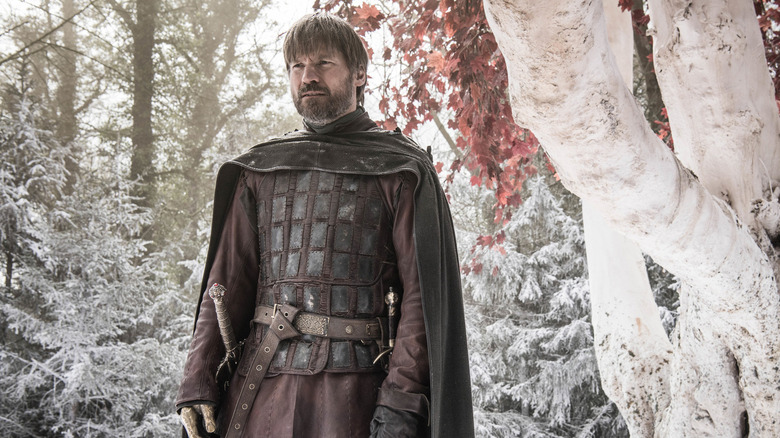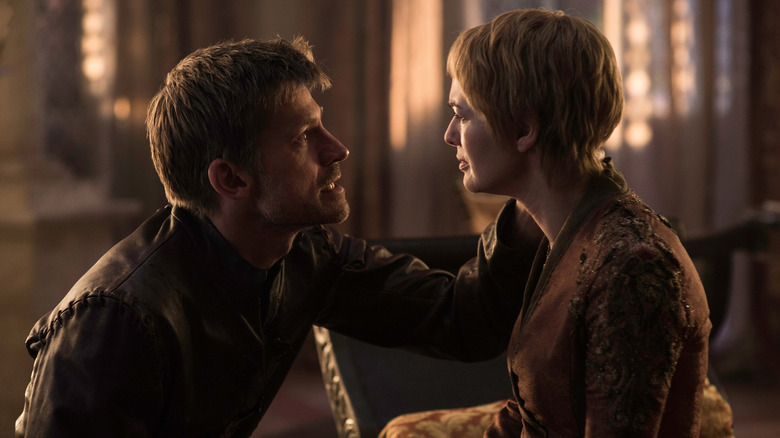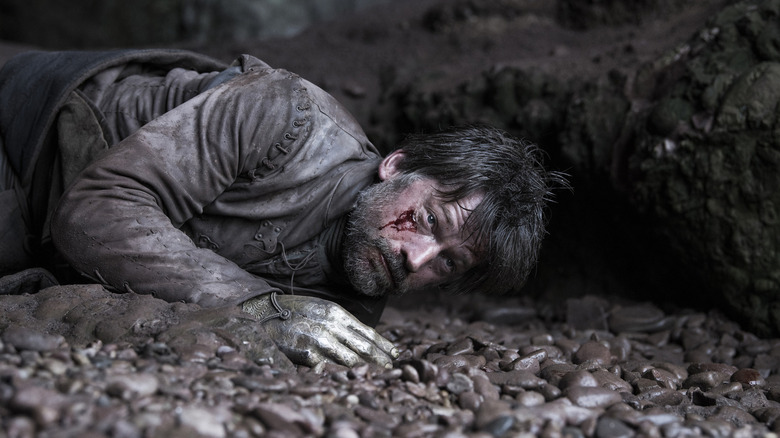How Nikolaj Coster-Waldau Feels About Game Of Thrones' Ending
If you're an actor whose signature project ends in a spectacularly bad fashion, you're probably put into a very tough spot. On the one hand, you shouldn't bite the hand that feeds you and be like, "Wow, can you believe that ending? That sucked!" On the other hand, I'd be willing to bet that it's really annoying to keep defending a finale that most people just absolutely hated. I'll stop talking in circles and get to the point: The "Game of Thrones" finale is widely reviled, and one of the show's stars, Nikolaj Coster-Waldau, weighed in on the issue in 2025.
Speaking to The Telegraph to promote his project with the BBC, "King & Conqueror" (where he plays the real historical figure William of Normandy), Coster-Waldau discussed just how green he was as an actor when he started as Jaime Lannister on "Game of Thrones," and of course, profiler Ellie Harrison asked about the show's eighth and final season. As far as the backlash against the entire season and its finale, "The Iron Throne," goes, Coster-Waldau took it in stride.
"It was expected," he told Harrison. "How are you ever gonna make an end that's gonna satisfy everyone? That's a very difficult thing. I absolutely think people are entitled to whatever opinion they have, but it's a television show. Someone told you a story and you didn't like the ending. It's really annoying, but..." (Here, Harrison notes that Coster-Waldau simply trailed off and shrugged.)
With all due respect to Coster-Waldau, that's a bunch of baloney. "Someone told you a story and you didn't like the ending" is a hell of a way to hand-wave away the extremely rushed pace of the final season of "Game of Thrones," to say nothing of the rip in the time-space continuum that emerged around season 7 and allowed characters to apparently fast-travel throughout the massive continent of Westeros, or the absolutely absurd character assassinations and attempts to "subvert expectations" that just turned out stupid. I know that some of my colleagues right here at /Film will go to bat for the ending of "Game of Thrones," and that's their right, but they're wrong, and so is Coster-Waldau. What's especially frustrating about this non-committal answer is that, out of all of the major characters on "Game of Thrones," Jaime's ending is one of the show's most frustrating conclusions.
Who was Jaime Lannister on Game of Thrones, and how did the series assassinate his character?
When we first meet Jaime Lannister in the pilot of "Game of Thrones," we learn that his nickname, "Kingslayer," was earned when he turned on the Mad King Aerys II Targaryen and executed the ruler before he could destroy the realm; even though his intentions were to save Aerys' people in the face of his tyranny, "Kingslayer" isn't exactly a flattering nickname. I'd argue that the fact that Jaime has been having a years-long incestuous relationship with his twin sister Cersei Lannister (Lena Headey), the queen of the Seven Kingdoms and wife of King Robert Baratheon (Mark Addy), is much grosser and worse than killing a king who planned to kill the entire populace. Plus, to preserve the secrecy surrounding the illicit affair, Jaime pushes a kid, Bran Stark (Isaac Hempstead-Wright), out of a tower after he catches the twins in flagrante, so that's not great either.
Throughout "Game of Thrones," though, we learn more about Jaime's character and watch as he evolves. As a skilled swordsman and warrior, Jaime is always a little too arrogant for his own good ... but he loses that confidence in season 3 when, while he's held captive alongside Brienne of Tarth (Gwendoline Christie), his sword hand is chopped off. (In a scene after he loses his hand — specifically, in the season 3 episode "Kissed by Fire" — Jaime explains to Brienne that he only killed Aerys to save everyone else, which also marks the first time the audience hears the whole story, and it's unbelievably affecting.) Jaime and Brienne, who were initially enemies, become unlikely friends, and at the end of season 7, he chooses the path of righteousness and joins Bran, Jon Snow (Kit Harington), and the show's other heroes to help fight the White Walkers coming from the North.
Season 8 is where Jaime, along with other characters like his brother Tyrion (Peter Dinklage), develops a major case of the stupids for no reason. After "knighting" Brienne before the Battle of Winterfell and sleeping with her after their victory over the White Walkers, he abandons her only to return to Cersei, telling Brienne, "She's hateful, and so am I." By the time Jaime makes it back to King's Landing, Daenerys Targaryen (Emilia Clarke) is attacking the capital on dragonback — and after Jaime fights off Euron Greyjoy (Pilou Asbæk), he reunites with Cersei just as the Red Keep falls and crushes them as they embrace. This ending is stupid as hell, but Nikolaj Coster-Waldau did, inexplicably, defend it after the fact.
Jaime's death on Game of Thrones is wildly anticlimactic, but Nikolaj Coster-Waldau defends the creative decision
Nikolaj Coster-Waldau spoke to Entertainment Weekly in May 2019, right after the show's penultimate episode "The Bells" (which features Jaime and Cersei's joint death) aired. (Neither he nor Lena Headey appear in the finale, "The Iron Throne.") Speaking to James Hibberd, who went on to pen the "Game of Thrones" oral history "Fire Cannot Kill a Dragon," Coster-Waldau strongly suggested that, despite Jaime's personal growth and the consummation of his relationship with Brienne, their ending would never be happy. As he put it:
"You know he's gonna go back, and it's not gonna have a happy ending, is it? The hardest thing is the fact they actually find the balance because he ends up with Brienne for a brief moment. He kinda knows himself there is no alternative. For a moment he tricks himself into thinking there is an alternative to his life. As an audience you want him to succeed in taking that different route. You wonder if he's changed and if he's escaped this destructive relationship."
Hibberd pointed out that fans were "heartbroken" by Jaime's heel turn, and Coster-Waldau justified that as well. "It is heartbreaking. It does make sense, even though you don't want it to," Coster-Waldau replied. "And the way it ends with him, he finally finds [Cersei] and it's a beautiful ending."
As for that incredibly stupid ending for Cersei and Jaime — who, it seems, could have moved five feet to their right and avoided being crushed by falling rocks, considering that large swathes of the room are still intact when Tyrion finds his siblings at the start of "The Iron Throne" — Coster-Waldau says he liked that too. "I thought it was a great ending for that couple," he said, recalling the time that Jaime said in season 4 that he hoped to die "in the arms of the woman [he loves]." Finally, he praised the finale: "I don't think they could have done it any better. It makes sense. There's a logic to it without it being obvious at all."
Again, I'm not trying to be rude to Coster-Waldau, but this is ridiculous. Yes, many "Game of Thrones" fans had a knee-jerk reaction to the final season and finale, but also, the narrative structure of both is incredibly flawed from a writing perspective. Jaime could have died with Cersei, but his betrayal of Brienne and the twins' ludicrous death undoes character development to the point where it actually feels insulting. Coster-Waldau is entitled to his opinion, though, and if you want to decide if he's right or wrong, "Game of Thrones" is streaming on HBO Max now.


